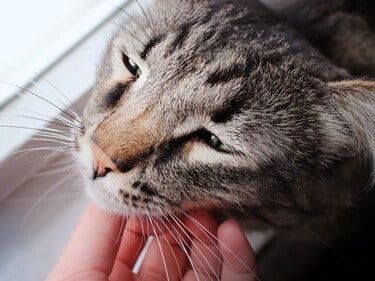Losing a cat suddenly is our greatest fear. When a cat is taken unexpectedly due to a sudden illness or road traffic accident, the impact can be overwhelming. It takes a huge emotional and psychological toll on those it leaves behind.
Treat the sudden loss of a cat the same way you would a human death. Say goodbye, acknowledge your grief, and allow yourself to feel sad. At the same time, focus on the good times you spent with your cat. Seek support from friends, family, or counseling groups. Also, consider donating to a cat shelter in memory of your cat.
Cats are a special part of our family. This makes the sudden and unexpected loss of a cat feel like a human bereavement, so this must be acknowledged. There is no shame in grieving the loss of a beloved feline companion.
Coping with the Sudden Loss of a Cat
The sudden death of a cat is a horrible experience. Without time to steel yourself, the loss will be harrowing. There are warning signs to look out for that a cat is nearing the end of its life. These include:
- Not eating food
- Regularly eliminating outside the litter box
- Difficulty breathing
- Body temperature below 100 degrees Fahrenheit and inability to warm up
- Isolating and hiding by choice
- Failing to groom itself
If you see these warnings, you may need to prepare for the worst. The loss will still be painful and heart-wrenching, but you will know what’s going to happen.
Accidents, such as road traffic collisions or sudden illnesses, are much harder to accept because you don’t have the chance to ready yourself. Your cat may have been fine in the morning but gone by the afternoon. In such tragic circumstances, you will need to find a coping mechanism.
Acknowledge Your Grief
If you lose a cat, you will experience grief. The loss of a beloved pet is no different from losing a human family member. The unexpected demise will only make events more upsetting. This means that you will go through the 5 stages of grief outlined by the Kübler-Ross model:
- Denial
- Anger
- Bargaining
- Depression
- Acceptance
Initially, you may refuse to accept that your cat is gone. You will likely expect it to jump into your lap at any moment. You may set out food and water out of habit. When you remember what has transpired, you may grow angry. The whole experience will feel so unfair.
The bargaining stage can be linked to guilt. You may find yourself running through endless “what if?” scenarios. You’ll wonder if things could have been different. This will increase the hole in your heart caused by your cat’s death.
The pain will gradually lessen, leading to acceptance. There is no timetable attached to grief. Do not feel bad about yourself if you are still anguished after weeks or months. You need to complete the grieving process in your own time.
Accept that you are grieving and don’t fight the process. Grief is a tunnel that needs to be walked through. It cannot be dug under, walked around, or climbed over. Eventually, when you are ready, you will walk through that tunnel.
Say Goodbye
You do need to say goodbye to your cat. The sudden nature of its passing will take you by surprise. You will not want to be left with a feeling of unfinished business.
It is up to you as to how you go about saying goodbye to a cat. A lot depends on the logistical arrangements. If you need to dispose of the cat’s body, think about how you’ll do so. You have several options:
- If the cat was euthanized, ask your vet if they have a garden of remembrance
- Check if there is a pet cemetery in your area
- Bury the cat in your backyard, at least 2 feet deep
- Investigate local animal cremation facilities
Holding a funeral for your cat may also be cathartic. Ask friends and loved ones to attend, sharing memories of your cat’s life. This way, you can ensure that you hold onto happy memories at a crushingly sad time. In addition, you can lean on loved ones around you for support.
Create a Memorial
When the time is right, you may be able to donate your cat’s belongings to an animal shelter to help others. This does not mean that you are purging all traces of your cat. Your pet may be gone, but it will never be forgotten.
Create a memorial for your cat. Gather favored photos of your cat and make a scrapbook or collage. This can be done with family members as a communal exercise in catharsis. You could also create a memorial tombstone or plant flowers or a tree in your cat’s memory.
This way, you will always feel a connection with your cat. You can visit it in spirit, if not in body. Perhaps more importantly, you can recall happy memories. When the sharp sting of grief fades, you may be glad of this opportunity.
Share Your Feelings
Nobody should go through bereavement alone. You need to share your feelings and let them out. Failure to do so will allow overwhelming sadness to build.
Speak to friends, family, and neighbors that loved your cat. Talk about past times and laugh at memories. You may find that others are saddened by the loss, too. Communal grief can be a powerful healing mechanism.
You could also consider counseling. The loss of pets is taken increasingly seriously in the 21st Century. Many professional counselors will be prepared to discuss your innermost feelings.
Write your cat a letter detailing how much you enjoyed your time together. The online realm also hosts many cat forums designed to aid and support during pet bereavement.

Distract Yourself
The loss of a cat hits hard because they spend so much time in the home with you. You will be used to relaxing in your home with your cat in your lap.
While grieving, undertake a new hobby. Take long walks in nature, volunteer at a local charity, work in your backyard, or start a creative endeavor, like painting or writing. These can be great ways to process your emotions.
You may even wish to consider taking a vacation. If concerns over cat care prevented you from traveling, this is the time to rectify that. Doing so is not betraying the memory of your cat. It is a pivotal step to starting a new life.
There are still pleasures to be found in life. It’s undeniable that you will feel like the world has lost its sparkle for a while. By undertaking activities that would not have involved your cat, you can find new and interesting passions.
I Can’t Get Over the Death of My Cat
You will be able to cope with your loss one day. It will not be an easy journey, but you will complete it. The key is to take each day as it comes. Every morning, upon waking, your heart will hurt a little less. Eventually, memories will make you smile rather than cry.
Keep working through the techniques we’ve discussed to manage the mourning process. Go at a pace that suits you. There is no “right way” to grieve. Some overcome the demise of a cat faster than others.
Consider the impact of pet bereavement on others, including humans and animals. While it is important to acknowledge and manage your own grief, others may also need your support.
Children
The hardest part of losing a cat suddenly is explaining the event to a young child. In addition, children will have their own grief journey to undertake. This will be made worse due to a lack of full comprehension as to what happened.
It is not just toddlers that will struggle. The Journal of Counselling and Development explains how hard pet bereavement can hit teenagers. The study claims that adolescent girls especially struggle with such emotional trauma.
Stick to the facts in explaining sudden cat death to a child. Just keep things age-appropriate. Do not claim that the cat ran away and will come back soon. Explain that there was an accident or illness and the cat could not continue living.
Beyond this, offer support. Remember, the loss of a cat will impact your entire family. Try not to allow your own sadness to overcome everyday life. Allow children to grieve in their own way, showing patience and understanding.
If you work together, you can share the bereavement journey. This will help all of you to come to terms with your cat passing away. You need to ultimately move on, if only for the sake of your children.
Surviving Cats
It is not just your human family that will notice the death of a cat. Other pets, especially fellow felines, will sense the change in circumstances. Even if two cats did not get along, one passing may still be mourned. Signs that a cat is feeling depressed include:
- Increased vocalization and clinginess
- Loss of appetite
- Urinating outside the litter box
- Constipation
- Grooming to excess
- Hiding and sleeping more than usual
If you notice these signs, make time for play, ensuring that no further routines are changed. Even if you are not in the mood, take the time to meet the cat’s needs. A living cat’s reliance upon you to meet its needs has not changed.
Your surviving cats can also be a source of comfort at this time. Anthrozoös explains how a depressed mindset usually leads to instigating more interaction with a feline.
My Cat Died and I Feel Guilty
Guilt is an emotion commonly associated with bereavement. Death Studies claims that a positive end-of-life experience minimizes the feeling of guilt. In the event of sudden cat death, this may not have been an option. An expected loss may have been traumatic.
If your cat dies suddenly, you will understandably look for an explanation. Thoughts may then turn to self-flagellation. Should you have noticed ill health earlier? Did you leave the front door open, leading to a traffic collision? Did you leave toxic food within a cat’s reach?
Guilt, like all emotions connected with bereavement, will fade over time. You need to overcome these feelings yourself, though. You cannot turn back time. Constantly re-running events in your own mind prolongs the grieving process.
Even if you do not blame yourself directly for your cat’s demise, you may dwell. Don’t berate yourself for the times you were too busy to play or pet a cat. Instead, think about the sacrifices you made to make your cat happy.
Take a leaf from your cat’s book and practice forgiveness. Your cat forgave you for being late with a meal or accidentally stepping on its tail. Practice this same forgiveness with yourself.

Euthanasia
If you were forced to euthanize your cat, guilt is likely to be magnified. You may feel responsible for your cat’s death. However, no vet will decide to euthanize lightly. If this action was recommended by a professional, it was for the best. The most common reasons for euthanizing a cat are:
- Injury or illness that makes breathing difficult or impossible
- Severe injury that will lead to chronic pain
- Injury or illness that compromises a cat’s quality of life beyond reasonable levels
- Terminal illness that would otherwise lead to a prolonged, painful demise
Euthanasia opens up a new set of emotional difficulties. You’ll need to decide whether to be present when the injection is administered. You’ll then need to deal with the aftermath.
Should I Get a New Cat?
Some owners cannot contemplate the idea of adopting a new pet after a sudden loss. It seems unfaithful to the memory of a dearly departed companion. This is not the case. An abundance of cats still needs loving homes.
Only you will know if your heart is healed enough to take on a new cat. Take the time to grieve for your lost companion before making this decision. As you know, taking care of cats is a significant emotional undertaking.
Avoid the temptation to get a new cat to ease your pain. Cats, like people, cannot be replaced. They are all unique with their own personalities. This means you’ll have a different relationship with another cat.
In addition, it takes time for a bond to form between humans and felines. The bond with your previous cat had time to grow organically. You cannot expect a new cat to share the same sense of kinship immediately.
If you worry that you cannot care for another cat, consider getting another pet. It is unfair to take on a cat if you will constantly liken it to a previous companion. This way, you are less likely to draw unfavorable comparisons.
If you miss having feline company, you can volunteer at a local cat shelter. Your assistance will be gratefully received. Spend time with the cats of friends or family, too. You can still play with and care for cats.
Losing a cat is a heartbreaking experience. Draw comfort from the times that you shared as your cat had a good life. It knew that you did everything you could to make it happy. You hurt because you cared so much.


Thank you for this article. With our recent sudden loss of our cat, I found some comfort in this.
Thank you, your article is very helpful. I have just returned from a lovely holiday to find that my 7 year old cat has died in the cattery. He was happy and content and eating and then sudden death occurred without any explanation. Your article is very helpful.
Thank you for this advice. We just had Goldie put to sleep because of her terminal cancer diagnosis. I had her almost 14 years, adopted from a cat charity at age 4 months. She chose me. I am finding her loss unbearable, the decision to let her go was so hard and I am devastated. I can’t contemplate my life without her (I’m retired) but I am grateful to have a loving partner and wonderful daughter living close by although I do live alone. I want to get away but that’s not possible at the moment. I miss Goldie so much :'(
Just the moments are difficult throughout the day. I lost my best friend, Mango. He was almost 14 and was such a huge part of my life. He was my life support when I was very sick. We had a connection beyond measure. It has only been 12 hours and I am so weak and sad. The memories outway the sadness, but this grieving is so very hard.
Thank you for your article. One of my cats ran over by a car. I often wonder if all was just a dream but I saw her body so it is all real. It is still very raw but will take your advice. It will take time. Thanks again
Thank you for your advice. My 19yr old Fiona suddenly declined last Sunday. The ER vet could not save her. I took the next day off from work and sequestered myself and just sobbed.
I worry about her feline buddy Summit. They ate together and teased each other; but Fiona was the boss cat. Summit now seems to sleep a great deal more than usual. He will sleep on me for 5min then leave to another spot.
If you can, can you create a video on ‘how to help your cat if it loses its life partner’? Thank you Mr. Parker.